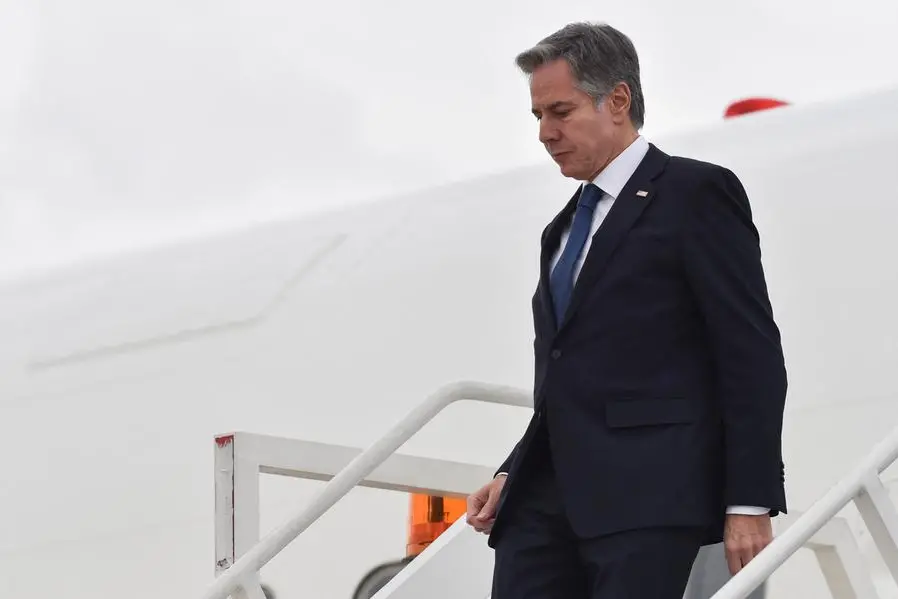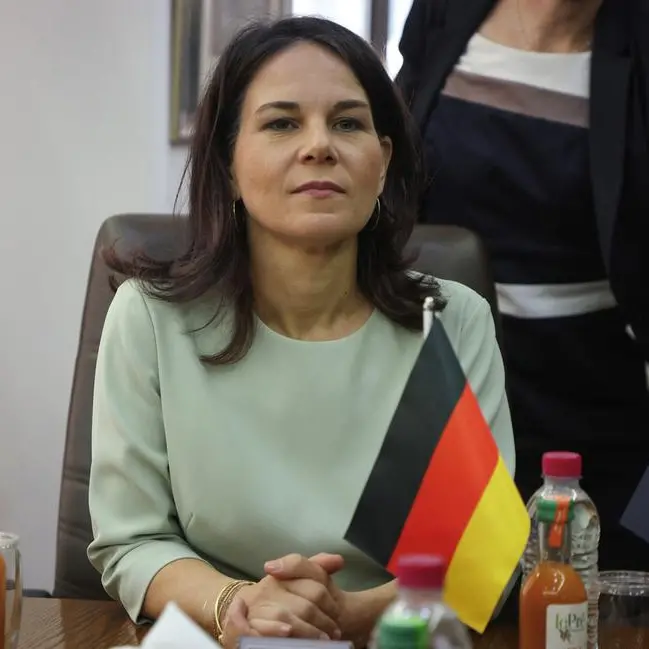PHOTO
US Secretary of State Antony Blinken headed back to the Middle East Thursday on his fourth trip since the Israel-Hamas war began, expecting tough talks as he presses for immediate new aid for battered Gaza and regional de-escalation.
The top American diplomat will visit both Israel and the West Bank, home of the Palestinian Authority, and five Arab countries -- Egypt, Jordan, Qatar, Saudi Arabia and the United Arab Emirates, the State Department said.
Blinken departed late Thursday bound first for Turkey -- an uneasy US ally that is the home of key Hamas leaders despite being one of the few Muslim-majority countries to recognize Israel -- followed by Greece.
He will discuss "immediate measures to increase substantially humanitarian assistance to Gaza," where the World Health Organization has warned of the risk of famine and disease.
"We don't expect every conversation on this trip to be easy. There are obviously tough issues facing the region and difficult choices ahead," State Department spokesman Matthew Miller told reporters.
"But the secretary believes it is the responsibility of the United States of America to lead diplomatic efforts to tackle those challenges head on," he said.
Blinken on previous trips sought to keep the war isolated to Gaza. But he returns to a region that has seen attacks in or from Lebanon, Iraq, Yemen, Syria and Iran.
A strike inside Lebanon widely assumed to have been carried out by Israel killed a top Hamas leader on Tuesday, and Iran-backed Huthi rebels have been firing on ships in the Red Sea in avowed solidarity with Gaza.
In a pre-trip telephone call, Blinken agreed with French Foreign Minister Catherine Colonna to seek to "de-escalate tensions in the West Bank and to avoid escalation in Lebanon and Iran," the State Department said.
Iran was hit Wednesday by one of the deadliest attacks since its 1979 Islamic revolution, with twin blasts killing at least 84 people gathered to commemorate a slain Revolutionary Guards general.
Tehran initially blamed Israel and the United States, although the Islamic State group later claimed responsibility and US officials rejected any US or Israeli role.
- Mounting toll -
President Joe Biden's administration has provided crucial support for Israel since it suffered its deadliest-ever attack on October 7, when Hamas fighters streamed across the militarized border and killed around 1,140 people, most of them civilians, according to an AFP tally based on Israeli figures.
The United States has twice exercised its veto at the UN Security Council against ceasefire calls, drawing outrage in the Arab world, and just days ago Blinken for the second time bypassed Congress to rush weapons to Israel.
But Biden has also openly voiced exasperation at Prime Minister Benjamin Netanyahu as he pursues a relentless retaliatory offensive in the Hamas-ruled Gaza Strip, much of which has been reduced to rubble.
More than 22,400 people in Gaza have died, mostly civilians, according to the Hamas-run health ministry, and the vast majority of residents of the impoverished and blockaded territory have been forced from their homes.
The Biden administration has taken credit for coaxing Israel on several aid issues, including allowing limited gas and commercial trucks to enter.
Another concern for the Biden administration has been calls by far-right members of Netanyahu's cabinet for Palestinians to be encouraged to leave the Gaza Strip en masse.
Blinken is also likely to press Israel to stop blocking the transfer of tax revenue to the Palestinian Authority, a longstanding arrangement that is opposed by Israel's far-right finance minister, Bezalel Smotrich.
Washington sees a future in the Gaza Strip for the Palestinian Authority, whose ruling Fatah faction is the rival of Hamas, but Netanyahu has long sought to weaken the semi-autonomous body and opposes the eventual creation of a Palestinian state.
- Turkey-Greece balance -
Blinken will pay a brief visit Saturday to Greece, which is jittery about an expected US sale of advanced F-16 fighter jets to Turkey, its historic adversary.
The Biden administration is expected to offer the jets once Turkey gives a long-delayed greenlight to NATO membership for Sweden, which shed earlier hesitation on entering the Western military alliance following Russia's invasion of Ukraine.
NATO requires unanimity and Turkish President Recep Tayyip Erdogan had used his leverage to press for concessions, including action by Sweden against Kurdish militants opposed to Ankara.
Turkey's parliament is moving ahead on ratification. Turkey last year allowed the entry into NATO of Finland, which had launched a joint membership bid with Sweden.












